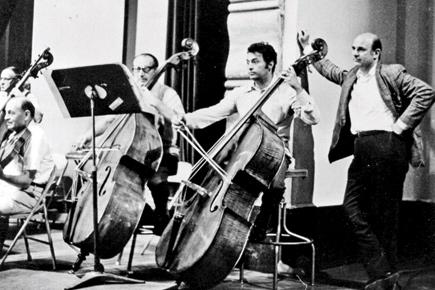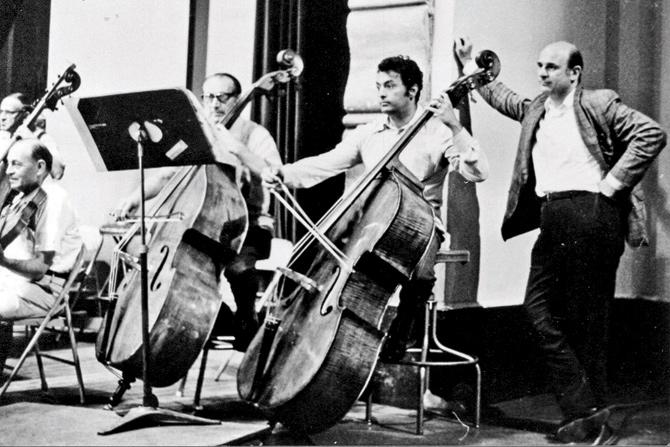A lover of trivia (not Western clasical music) with a high-ranking Railways job is the man behind Zubin Mehta’s much awaited biography

Zubin Mehta plays the double bass, 1966
Zubin Mehta's 80th birthday will be commemorated by the release of his authorised biography. It is written by two men sharing a 52-year-old body — Bakhtiar K. Dadabhoy, a jolly bachelor with great faith in Sai Baba; and a Divisional Railway Manager (Pune), who is self-confessedly the "country's highest ranking Parsi civil servant".

Zubin Mehta plays the double bass, 1966. Pic/Zubin Rney
The latter is a small man sitting in the largest office at the administrative block of the Pune Railway Division; the former guffaws when you call his cabin "a Mumbai-sized two-BHK". Both like single malt and agree that "we Parsis don't marry!" Both accumulate too many books for them to be convenient in a transferrable job.
Interestingly, Dadabhoy is not overtly interested in Western classical music. "Zubin [Mehta] asked me this when he met me, 'Tu music samjhech? [Do you understand music?] Do you like it?' While I like it, I would be lying if I said that I understood it'," I said.

Bakhtiar K. Dadabhoy
What he likes to do is write books, and Zubin Mehta: A Musical Journey is his seventh.
A man who loves trivia, his first came out in 2003 and it was called the Dictionary of Dates. "I was always interesting in quizzing and appeared in BBC's MasterMind in 2001. I had this habit of noting down things about dates — what happened on which day, who was born when, who died when…After a couple of years of doing this, I realised I had a variety of interesting stuff and approached a publisher to convert it into a book."
The book lead to the column, This Day in History which ran for five years with a national newspaper in Delhi. Then came a biography of JRD Tata (2005) to celebrate his birth centenary; a slim book on the ICC Championship trophy with a brief history of Brabourne stadium, and the Barons of Banking: Glimpses of Indian Banking History (2013).
In 2008, he wrote Sugar in Milk which contained profiles of 12 eminent Parsis. Zubin Mehta was one of them and there were brief chats over e-mail. It was during this that the idea of a full-fledged biography on the musical maestro took root. There are two versions of why he chose the subject.
The outer bureaucrat says, "In the world of music, Zubin bestrides the podium like a colossus. Yet, I didn't understand why no one had written more on him. There was an early biography in 1978 and then came his memoirs, The Score of My Life in 2008, which was originally written in German. I couldn't help thinking that his life had been far more interesting than the understated account given in his own autobiography."
The inner merryheart's version is better: "I was always taken by this man. You know you have an image of what you would have liked to be — good-looking, rich, famous, talented…that sort of a thing. [I thought] Look, this guy is everything I am not. So, why not write about him and live his life vicariously? I hope you are not going to write that. Don't embarrass me!"
Dadabhoy began researching Mehta's life in late 2008. "I had a professor of German translate the memoirs. Then I downloaded articles on him from the online archives of top international publications, going back to 1958. That year was when he was first written about in Time magazine after winning the International Conducting Competition in Liverpool and first came to international attention."
Dadabhoy wrote to key people in Mehta's life including the inspector general of the Israel Philharmonic Orchestra (IPO) Avi Shoshani, who has been a close friend for more than 40 years; and Peter Marck, lead bassist for the IPO and a close associate. "He sent me a lot of material pertaining to Zubin's early period with the orchestra such as who he was friends with, how he was hired and also volunteered photographs," says Dadabhoy.
One picture of pride is that of the author as a young fan, posing with the maestro in 1984. "It's a priceless photograph in which I am barely recognisable. This was when he came with the New York Philharmonic Orchestra to Delhi. I can't forget the way he played our national anthem. It brought a tear to the eye. In Delhi, at that time, surprisingly, there was no rush to meet him backstage. Ours was the only family and there was one other guy who took the photograph. For Sugar in Milk, I Photoshopped the rest of my family out, but this time I have not done that."
By the time Dadabhoy was transferred to Pune in August 2015, all the writing was done and only chipping at the manuscript remained. He touched upon Mehta's personal life only briefly because there was a lot written about it in the papers anyway. He focused more on Zubin's father Mehli and other Parsi musicians who embraced Western classical music.
"The Parsis took to Western classical music much, much before anyone else did," says Dadabhoy, who was educated in Delhi where his late father, a former Director General of Police, was posted. "There would have been no Zubin without Mehli. If Zubin is the flag, Mehli is the flag post." Along with Mehli was another musician called Mehli Casinath who had a band, wrote music and played at Navjotes (thread ceremony) and weddings. In this band was a young violinist who ultimately courted fame as India's best lawyer, Nani Palkhivala.
"Mehli Mehta was an accomplished violinist, an autodidact. He had this tremendous ability to teach himself music. He was a very talented musician and a very competent conductor too. There is no doubt that Zubin had actually followed his father's talented baton. Later, of course, he was more famous for the exceptional training he gave to young musicians as conductor for 33 years of the American Youth Symphony in Los Angeles."
Dadabhoy had an inkling that Mehta might want to take control of the book and eventually, he did authorise it when he realised how deeply the former had researched his life. "The book has undergone long periods of dormancy and was started eight years ago. In late 2014, Kekoo Nicholson, president of the Cricket Club of India and a friend, mentioned that Zubin would be coming to Mumbai in April 2016 for a grand concert at the Brabourne Stadium. That rekindled hope since I thought that a biography on one's 80th birthday is not such a bad idea. I approached Zubin with renewed optimism. This time he did not disappoint me."
He warned Mehta that this would not be a hagiography, though it does stay away from his controversial personal life and Mehta agreed saying it would be no good to have a book with only compliments. A few factual corrections in the manuscript over two phone calls and meetings, and the book had Zubin's seal of approval.
Now there is a vacuum in Dadabhoy's life that will have to be filled by a new goal after some well-earned rest and an on-the-rocks.
 Subscribe today by clicking the link and stay updated with the latest news!" Click here!
Subscribe today by clicking the link and stay updated with the latest news!" Click here!








